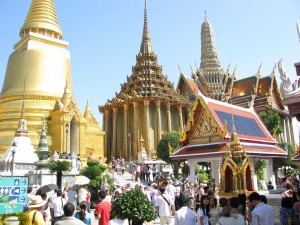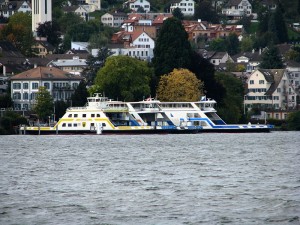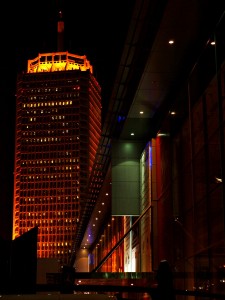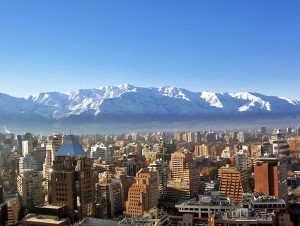It’s a comfortable life in Victoria–nice climate, amazing scenery, good universities, lots of golf courses and a varied outdoor life hard to find elsewhere. But a few restless business people have heard the siren call of far-off lands, and these Victorians have pulled up stakes, most of them for good.
Pat Dean
 If you are in Bangkok and looking for a little exercise, a spa experience or a first class restaurant, call Pat Dean to see if there is space in at the Cascade Club and Spa or the Green Leaf Spa or Aldo’s Mediterranean Bistro and Bar. They’re all owned by the ex-Victorian as part of his mini-empire in Asia.
If you are in Bangkok and looking for a little exercise, a spa experience or a first class restaurant, call Pat Dean to see if there is space in at the Cascade Club and Spa or the Green Leaf Spa or Aldo’s Mediterranean Bistro and Bar. They’re all owned by the ex-Victorian as part of his mini-empire in Asia.
“The best part of living here is that it suits my lifestyle. I love sports and on any day I can sail, golf, play tennis or go scuba diving. In fact, I just bought a golf membership at a club in Bangkok and green fees are about $10 a round. You can’t beat that,” laughs Dean.
His ex-pat life started in Kuala Lumpur, Malaysia. In 1981, he was a brand-new University of Victoria grad in human performance and sport management. Another student from the same program working in Singapore told him about a job in Malaysia, getting the doors open at a new sports and fitness club in the Malaysian capital.
“The opportunity came out of the blue and I could not pass it up,” Dean said. After that initial success under his belt, he was approached in 1985 by Club Corp. of America, the largest sports and recreation company in the world (they own among other properties the Pinehurst Golf and Country Club in the U.S.) to be their Director, Sports and Recreation – Asia, a position he held until 1988 when the spirit of entrepreneurship hit him and he started his own company, Sports Engineering and Recreation Asia Ltd. or SEARA. The first job his new company landed was a US$38million contract to redevelop the American Club in Singapore. Fast forward a few decades and SEARA is the core company of the six he owns today.
In 1991 Dean approached Life Fitness and Cybex, two of the world’s largest manufacturers of fitness and sports equipment to be their representative in Singapore. Unfortunately they already had a representative covering the Island State, but they told him he was welcome to Thailand, Cambodia, Vietnam, Laos and Cambodia if he was interested. Was he! Ever the opportunity seeker, he packed up and moved to Thailand and has not looked back since. Along with SEARA he has started a construction company and developed a high-end spa in the seaside resort Pattaya. With a little over US$15million in sales annually, he and his business partner (an expatriate American) see nothing but opportunity on the horizon. “Two places that have been great for our business are Vietnam and the Maldives. Last year we did about $2million in sales in the Maldives. It’s just resorts there and the people are wonderful,” Dean states. “Working and living in Asia is amazing in the diversity of people and cultures that I am involved with. My role in the company is to be the people guy and nothing makes me happier than getting on an airplane and heading off to another country,” he adds enthusiastically.
”It’s been quite a ride,” recalls Dean. With offices in six Asian countries he is always on the move. “One week I will be in China, the next in the Maldives and the week after that, Vietnam. In fact, our next big project is the development of a major sports and social club in Ho Chi Min City. The experience, food, culture, and people I get to work and be friends with are something you cannot measure in dollars. It’s always different and interesting, In Asia business is about relationships,” he continues. An example is the work we are currently involved with in the Maldives. When the resort owners are in Bangkok, part of my role is to host them while they are here and that builds strong business and personal bonds, leading to more business,” Dean explains. “But it’s not all fun and games. The bureaucracy in the region can drive you crazy. Bids for projects can have up to fifty documents which all need to be reviewed and signed.
“The tsunami a couple of years ago was terrible. I lost some friends in that and Thailand is still recovering,” Dean said. When asked about the recent political upheaval, he sighed.
“It would be really nice if CNN and the western press portrayed the situation as it really is. On television it was made to look like the entire city of Bangkok was under siege but in fact the city was operating normally.
Dean does get back to Victoria to visit his mother and twin brother twice a year but finds after about two weeks; it’s time to get back to the action. “Victoria and Vancouver are sleepy little towns where everything closes up by 8pm. Bangkok goes 24 hours a day, every day,” he says with a big grin. “My mother always lets me know there is a room waiting for me if I want to return but I don’t think I will take her up on the offer.”
Now 54, Dean does think about retirement but not in Victoria. He has just purchased two acres of land in Pattaya which is about an hour and half south of Bangkok. He is building his dream house which will include a tennis court and swimming pool. “It has views of the valley and the ocean and its warm all year round which for me as a sports enthusiast is perfect. The best part is my neighbours on each side of my house are the number one and two ranked tennis players in Thailand and while I don’t often win matches, they are good friends and it’s great fun”.
~
Cara Hogan
Cara Hogan went to the University of Victoria to get a degree in business but came away from her academic experience with a new husband and a new life about as far away from Duncan where she grew up as you can get. New York Times columnist Thomas Friedman is right, the world is flat and Cara is living proof. While attending University, she met a young German fellow studying business as an exchange student at UVIC, fell in love and, well, the rest is history.
 With an international business degree in hand but no job prospects nor a work visa, Hogan, and her new husband, Martin, headed to Frankfurt, Germany. For the past eight years it has been a whirlwind of new countries, cultures and friends.
With an international business degree in hand but no job prospects nor a work visa, Hogan, and her new husband, Martin, headed to Frankfurt, Germany. For the past eight years it has been a whirlwind of new countries, cultures and friends.
Her first job was with Deutsche Bank. Her colleagues were from Asia, Europe and India. “You would never be exposed to that or be able to get that sort of work experience in Victoria” she says.
“But my first interview was a real eye opener. Through networking, I got an interview for the position as Personal Assistant for the Head of Income and Corporate Actions Processing Department at Deutsche Bank. The person interviewing me was an expatriate from the United Kingdom. In my interview he asked me two things; “Do you mind if I f***ing swear?” and “I smoke in my office; will this bother you?” I didn’t get the job as his Personal Assistant. He said that I was over-qualified. That was probably my oddest and easiest interview to date,” laughs Hogan.
“Settling in to a European lifestyle was not too difficult,” Hogan notes. “It helped that I worked really hard at learning German from television, newspapers and talking to anyone I could.” Knowing the language allowed her to experience the culture in a way that speaking only English would never have allowed. “It also helped with the unbelievable bureaucracy in Germany. Obtaining a residence permit here is a bit like a catch 22 process,” Hogan recalls. “The permit office is only open a couple of hours a day and always has long line-ups of people applying for the permits. They give you a number and tell you to come back after you have obtained a police check from your own country which you then take back to the permit office and wait for hours to be called. Then they tell you that you don’t need the police report, stamp the permit and you are on your way”.
After a stint in Germany, Hogan and her husband headed off to the London for a year so he could pursue graduate studies in finance at the London School of Economics. Once that was completed it was then back to Europe and Horgen, Switzerland, which is about fifteen minutes by train to Zurich, where she landed a job with the U.S. based State Street Bank as an investment compliance manager.
While Hogan admittedly misses Vancouver Island and her family, she confirms, “I wouldn’t change what we have here for anything. Our friends come from around the world, we get to travel all over Eastern and Western Europe and all of the work I do is internationally focused. What’s not to enjoy?” she says with enthusiasm. “However, it’s not always easy being an expatriate. People in Switzerland have their own circle of friends and many here are reluctant to strike up friendships with expats believing they will be heading home soon.”
Hogan’s life has changed once again as she is now, at 33, the happy mother of beautiful five and half month old Louise. “With the new baby it does make us think of returning to Canada, but we would both have to change our career paths. There are not very many opportunities for the work we do in Victoria so it looks like we will be here for quite awhile,” she notes with a smile.
~
Cheryl Thomas
 If serendipity has ever played a role in your life, you will appreciate the circumstances of Cheryl Thomas.
If serendipity has ever played a role in your life, you will appreciate the circumstances of Cheryl Thomas.
Next time you are in Dubai you might want to look up Thomas. The best place to find her is at the Iran visa office haggling with officials for her next visa to Iran. Four years later and she is still fighting for visas but enjoying every minute of it.
Although her residence is in Dubai, in the United Arab Emirates, Thomas spends most of her time in Tehran where she heads up the Radman Consulting Group, or on Kish Island where she is the Co- Director of the International MBA program for Sharif University of Technology.
Thomas’s journey to Dubai and Iran started with a phone call from Eric West at Royal Roads University. Royal Roads had just partnered with Sharif University to deliver the Royal Roads MBA program in Tehran and West wanted to know if Thomas would like to be part of the teaching team. She doesn’t consider herself a world traveller but jumped at the opportunity to teach in Iran, and fell in love with the people and the country. The Royal Roads partnership with Sharif University abruptly ended, but as the proverb has it, another door opened. She saw an opportunity to develop and administer a western-style MBA program, and Sharif University liked her idea. Now four years later, she is still fighting for visas but enjoying every minute in the Middle East.
The-RRU-trained MBA students provided another opening. Some of them wanted to set up as consultants “and approached me about working with them on developing a new firm that would be unique in Iran.” “So with nine original partners, we started the Radman Consulting Group and while it has taken a bit of time getting established the work is flowing in the door,” she says. “With their local cultural knowledge, western management education and my drive to get things done it has worked quite well.” After 18 months, the consulting firm was profitable.
“The cultures of the Middle East are so different from Canada and from each other,” Thomas says. “Iranians are different from Saudi Arabians and they are different from those that come from the United Arab Emirates. Much of the society of the Middle East is changing,” she muses. “In many ways it is much like Canada was in the 1970’s, particularly with respect to women. The biggest change has been the increased role of women in business. Historically they have been doctors or lawyers, but more and more women are entering the senior ranks of management. While they still have to wear the hijab, they are demanding more equality and getting it,” she says with pride. “The most frustrating part is the image the West keeps presenting of women in this part of the world,” she laments. It is just wrong. Under the hijab they are strong and independent.”
Similar to the experiences of Pat Dean and Cara Hogan, Thomas admits that working in the UAE and Iran can be wearisome. “The bureaucracy is overwhelming, yes does not mean yes, and no one works during the afternoon. On the other hand, the warmth and generosity of the people is something you almost never get in Canada and that more than makes up for all the little frustrations.”
“I decided to live here to try and make a difference, particularly in Iran, through education and improving the consulting process,” says Thomas. “While it has been trying at times, the window of opportunity that presented itself has worked.
“Moving back to Victoria is an option and in a couple of years I will likely to do that. On the other hand, I don’t miss the snow or the Pat Bay Highway,” laughs Thomas, “and I would certainly miss the people and the flavour of the region,”
~
Barry Larson
Barry Larson lives in the quintessential British town of Toddington Bedfordshire a large village of 4,000 people about 60 kilometres northwest of London. It’s a place where the church was built in 1132 and the houses are half the size and twice the price of those in Victoria.
 Armed with a UVic business degree from the University of Victoria, his first job was with one of the best known Victoria technology firms, IVL. While managing an international portfolio of patent and trademark registrations, Larson became interested in international opportunities. Feeling a need to augment his education and his experience after four years with IVL, he packed up and moved to Edinburgh, Scotland to undertake his MBA degree. Soon after graduating, he was hired by Data Discoveries Ltd., a small but successful software company in Edinburgh and the die was cast, almost. After three years with Data Discoveries he seriously thought about moving back to Victoria until The Royal Mail Group came calling with a job opportunity in London. To sweeten the deal, they brought along a five figure signing bonus. Larson is currently the Head of Strategy-Media and his job is to grow and protect the $10 billion of media revenue within Royal Mail’s retail mail business.
Armed with a UVic business degree from the University of Victoria, his first job was with one of the best known Victoria technology firms, IVL. While managing an international portfolio of patent and trademark registrations, Larson became interested in international opportunities. Feeling a need to augment his education and his experience after four years with IVL, he packed up and moved to Edinburgh, Scotland to undertake his MBA degree. Soon after graduating, he was hired by Data Discoveries Ltd., a small but successful software company in Edinburgh and the die was cast, almost. After three years with Data Discoveries he seriously thought about moving back to Victoria until The Royal Mail Group came calling with a job opportunity in London. To sweeten the deal, they brought along a five figure signing bonus. Larson is currently the Head of Strategy-Media and his job is to grow and protect the $10 billion of media revenue within Royal Mail’s retail mail business.
He still has ties with Edinburgh though. “I own a small software company called Arbutus Ridge, a systems software company that provides an integrated marketing and IT system for the restaurant industry. “What’s really interesting.” he adds, “is that the company is headquartered in Edinburgh, the chief technology developer lives in New Zealand, I run it from London, and my sales people live in London.”
Why London? “Who wouldn’t want to work in London?” Larson exclaims. “It’s one of the great cities of the world where a multitude of cultures abound, Europe is on the doorstep and the work opportunities are endless. Not only that, but the perks of the job are first rate,” he suggests with a smile. “In large organizations like the Royal Mail Group for example we get six weeks holiday and the expatriate pay does not hurt, particularly when the pound was really strong against the Canadian dollar.” Another reason for remaining an ex-pat has nothing to do with the job. “One of my great joys of being here is the history and architecture, both strong interests of mine. It’s like being a tourist in your own town all the time. When I get blasé about five hundred year old buildings I know it will be time to leave, but that hasn’t happened yet.”
“There is a work culture and vitality about London that is hard to replicate that makes it so interesting. The British,” says Larson, “are incredibly competitive and results oriented.” “It’s as though they are all afraid of failing so they work that much harder.” It is very difficult to figure out at first but once you do it’s like being accepted into the club and once into the club, the possibilities abound.”
He admits to some pressure from family to return to Vancouver Island, but he’s resisting so far, “The laissez faire attitude towards business in Victoria, the tax regime and the small scale of business all keep me in London. But with two small daughters I am sure a time will come in the not too distant future that I will have to think about returning.”
~
Eric West
Eric West’s wandering the world started in 1959 in Victoria where he was a cadet at Royal Roads Military College. He went on to get a PhD from Iowa State University in statistics and computer science in 1970. West was the dean of the faculty of business at the University of Windsor for 15 years, then came back to Victoria to be dean of Management at Royal Roads. Then came the post of vice-president of RRU’s Centre for Global and Executive Development, where he and colleague Deborah Wickens developed the Royal Roads MBA program in Iran, which changed the life of Cheryl Thomas.
 After “retirement” in 2006 when he turned 65, he moved to a small town in southern Sweden where he is affectionately known as the itinerant professor. Most times when you call, he is in an airport heading off to teach or consult in Asia, the Middle East and points in Europe. Retired he isn’t.
After “retirement” in 2006 when he turned 65, he moved to a small town in southern Sweden where he is affectionately known as the itinerant professor. Most times when you call, he is in an airport heading off to teach or consult in Asia, the Middle East and points in Europe. Retired he isn’t.
Earlier this year, and a bit at loose ends, he got in contact with an old friend and colleague that he had met at a conference in 1992 but had not seen in many years. Their friendship was rekindled and that turned into romance. Eric is now in the process of moving to Santiago, Chile. You have to love Google.
But what about Victoria, he is asked. Don’t you miss it? “Of course, but the opportunity to live in Europe and now Chile can’t be missed,” says West. “A small example” he notes, “is a University I teach at in a dumpy little town in Finland where the teaching group are all visiting professors. During my last course there were professors from the United States, Latvia, Iceland and Malaysia. You just don’t get that international flavour in Victoria.”
“I can’t wait to get established in Santiago. It is a huge cosmopolitan city of five million people, with a Spanish flavour,” West enthuses. “I am working on learning Spanish which is a real challenge but it will certainly go a long way in blending into both the social and business community.”
“Social and business relationships are much more formal in Chile than in Canada and developing relationships is crucial,” West observes. “Chile considers itself the elite of South American countries and with that comes a level of snobbism and a class structure that is clearly defined. Family is most important and business is built upon close networks so the business structure is much like an extended family. Trust, respect and honesty are key to making business work.”
He admits Victoria would be nice to return to “but it so expensive compared to Santiago.” “For example a three bedroom upscale condo on the ocean is about US$90 thousand and restaurant meals are about half the cost but that is largely because the wine is so inexpensive, less than $5 a litre.”
His travels have taken him around the world and that of course begs the question what is the most interesting place he has been? “Without a doubt it is Kish Island in Iran,” he confirms. “It has a different feel about it compared to the rest of Iran. Much more western and relaxed but with same sense of warmth and hospitality you find throughout Iran.”
West’s future plans do include Canada. “I will spend about ten months of the year in Chile and two months in Canada but my heart is in Santiago so my roots will settle there,” West notes with a smile.
~
So much for the comfortable and sheltered life of Victoria for these intrepid travelers. The siren call of new opportunities, exotic cultures and fascinating people have driven them all to take the road less traveled. I have been down that road at different stages in my life with time in California, Edinburgh, Cambridge and Singapore and each place brought knowledge, awareness and sensitivity that I doubt I would have learned staying home. Perhaps it’s your turn?
Photo Credits
The Temple of the Emerald Buddha in Bangkok – Wikipedia Creative Commons
Horgen – Wikipedia Creative Commons
WTC At Night In Dubai – Wikipedia Creative Commons
Toddington Parish Church of St. George – Wikipedia Creative Commons
Santiago – Wikipedia Creative Commons
Thumbnail and Feature Image – London Bridge – Wikipedia Creative Commons
First Published In Douglas Magazine


Hi Doug
Great article! Good to know that there are plenty of people (and I would think your story covering four individuals is likely emblematic of a significantly bigger pool) who are striking out into international markets.
I particularly liked Cheryl Thomas’ story – fascinating! I recall the really groundbreaking connections that RRU was forging with Iranian students and I think it’s great that she has gone on to building professional networks there and in the Gulf. I have colleagues (from BC) who are working in the Emirates and certainly the consultancy practices they have built have been rewarding. There’s a huge amount of business there!
thanks – keep up the writing!
Eric
Hi Doug, thanks for sharing these stories. As someone who is relatively new to Victoria it has a dual interest to me. It gives me another perspective on my newly adopted city. But I also identify with the ‘ex-pats’ who have decided to move on — life is short and we all are enriched by exploring the places in our world where we feel most fulfilled. It’s great to get these very human perspectives on the diverse ways we can find our places (plural intentional) on the globe.
Dan-Many thanks. Glad you enjoyed it. New Zealand is a wonderful place to go to.
Doug
Thanks, Doug, for this wonderful perspective on leaving home and finding a wonderful life outside your comfort zone. It definitely has me thinking about that “one day” location (New Zealand) and how I might take it from “what if” to reality! Great article!
Dan